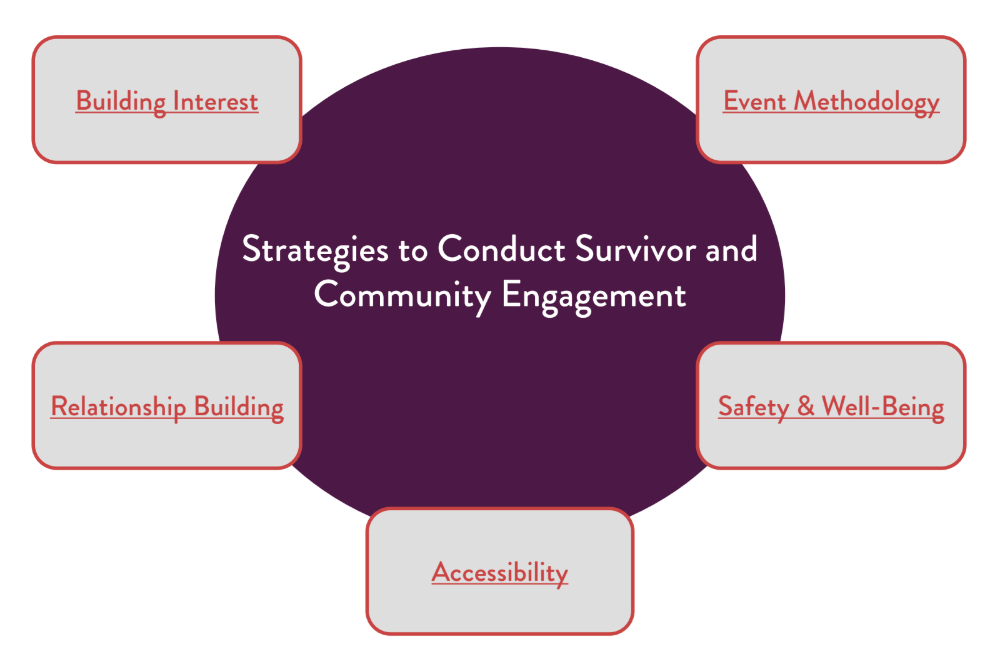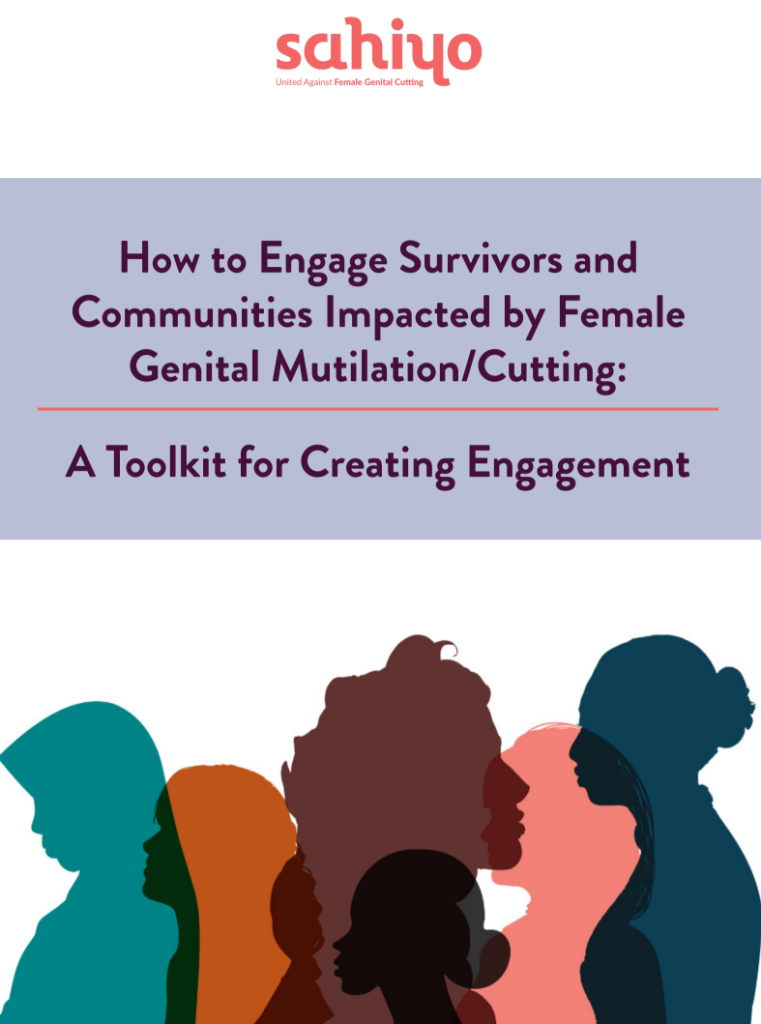Sahiyo Releases Toolkit for Survivor and Community Engagement to Address FGM/C

Sahiyo is pleased to announce the release of the new resource, How to Engage Survivors & Communities Impacted by Female Genital Mutilation/Cutting(FGM/C): A Toolkit for Creating Engagement. This toolkit aims to empower individuals and organizations who work to end FGM/C and support survivors through informed, respectful, and culturally sensitive engagement practices. Developed through a collaborative process, this toolkit is a culmination of real-world insights, proven strategies, and evidence-based methodologies gathered from community-based organizations across the United States. The resources provided will equip advocates with the tools they need to foster dialogues, build trust, and mobilize communities to challenge harmful social norms, ultimately contributing to the prevention of FGM/C and the empowerment of survivors throughout the U.S. The development of this toolkit reflects the collective expertise of our key stakeholders involved in the project. Their stories and experiences highlight the importance of listening, learning, and creating meaningful change. “Sahiyo is a powerful force among those seeking to prevent and respond to FGM/C in the United States. This toolkit marks an exciting expansion of Sahiyo’s efforts, by equipping other service providers, advocates, and community leaders with the resources necessary to engage ethically in the fight to eradicate FGM/C. In this toolkit, Sahiyo has compiled guidance and strategies from survivors and other thought leaders, so anyone with an interest in addressing FGM/C has an accessible way to do so.” – Hannah Feeney, RTI International The toolkit includes: Survivor and Community Engagement – An Overview, a discussion of why this resource is important and how it makes a difference. Ethical and Cultural Considerations to guide respectful and trauma-informed engagement. Strategies for Survivor and Community Engagement, includes real-world case studies and adaptable tools. Decision-making in Program and Event Planning shares ways to adapt various forms of engagement to suit the specific needs and contexts of each community. Sahiyo Co-Founder Mariya Taher emphasized that the “Recognition of FGM/C as a form of gender-based violence impacting those living in the U.S. has gained attention and increased awareness over the last few years, yet prevention and support services to address it are few. This vital resource examines how community-based organizations work across the U.S. to respond to this public health concern and offers valuable insights to others seeking to build similar programs and initiatives to address FGM/C.” As we release the toolkit, Sahiyo invites advocates, service providers, and community leaders to explore how the toolkit can support their work. For more information or to request a copy of the toolkit, please contact: info@sahiyo.org About Sahiyo: Sahiyo is dedicated to empowering Asian and other communities to end female genital cutting (FGM/C) and create positive social change. By working towards an FGM/C-free world, Sahiyo U.S. aims to recognize and emphasize the values of consent and a child’s/woman’s right over her own body, and to enable a culture in which female sexuality is not feared or suppressed but embraced as normal. We utilize collaborative grassroots campaigns, social mobilization, and storytelling techniques to train communities to build a critical mass of community-based voices against FGM/C and lead the change to end it. We also partner with frontline professionals (e.g. healthcare providers) to create culturally sensitive systems of care for survivors, and partner with government officials to address policy-level change.
Newly Released: Sahiyo’s Toolkit on Survivor and Community Engagement!

Here at Sahiyo, we believe that every individual and community impacted by female genital mutilation/cutting (FGM/C) deserves to be heard, supported, and empowered. That’s why we’ve created the How to Engage Survivors & Communities Impacted by Female Genital Mutilation/Cutting (FGM/C): A Toolkit for Creating Engagement (or Survivor & Community Engagement Toolkit, for short). A resource built for those on the front lines of prevention efforts, survivor advocacy, and community outreach. FGM/C is a deeply complex and culturally sensitive issue, which makes engaging with impacted communities challenging, but essential. This toolkit provides practical guidance and best practices for outreach, education, and support. It’s not just a collection of strategies; it is a product of lessons learned from real-world efforts across the U.S., gathered throughout 2023-2024 from grassroots organizations who have been working tirelessly to support survivors and prevent the practice of FGM/C. Why Survivor and Community Engagement Matters In the movement to end FGM/C and support those impacted by it,, engagement is key to progress. In our experience, and based on the insights shared with us from other organizations, we recognize that it’s not enough to just raise awareness—we need to connect, listen, and build trust with the communities impacted by FGM/C to fully engage on the topic. But what does “engagement” truly mean in this context? Engagement means showing up—not just as advocates or professionals, but as compassionate listeners, who seek to understand and not just respond. It is about actively connecting with and fostering understanding among a diverse group of individuals, including those who have experienced FGM/C, their families, friends, and even those who have not been directly impacted by FGM/C. Meaningful engagement creates spaces where survivors feel safe to share their stories, where their experiences are valued, and where they can contribute to solutions. It’s about bringing everyone into the conversation- men, adolescents, community leaders, elders, religious figures, teachers, and other local officials. The more voices we bring to the table, the stronger we become as a movement! “Unless you are engaged with the community, it’s very very hard to recruit women. They are culturally very sensitive. And they really don’t want to talk about it, about FGM/C, the harmful practice they have been through. For example, I am the impacted, the victim of FGM/C, I have the same experience as them and they feel comfortable to talk to me about it. They don’t trust you by the title, they trust you if you build a relationship with the community.” – Rufo Jiru, Anolee Sisters *This toolkit was completed on September 30, 2024. What’s Inside This Toolkit? We know that every community is unique, and we also know that addressing FGM/C requires multiple approaches that respect and reflect those differences within impacted communties. The toolkit is organized into sections that take you step-by-step, identifying the best ways to engage, support, and collaborate with the communities you serve. Here’s a glimpse of what’s inside: Survivor and Community Engagement – An Overview: Gain a holistic understanding of community and survivor engagement. Reviewing why it is important and how it makes a difference. Ethical and Cultural Considerations: Learn how to approach FGM/C with respect and cultural sensitivity. This section provides guidance to ensure mindful interactions. Strategies to Conduct Survivor & Community Engagement: Discover different methods to connect with and support individuals and communities impacted by FGM/C. Review case studies in which organizations share their experiences with community engagement and lessons learned. Decision-Making in Program and Event Planning: Understand that every community is unique. Learn ways to adapt various forms of engagement to suit the specific needs and contexts of each community. “Community engagement is very important because a lot of our clients face a lot of barriers to getting services. So creating those outreach and educational community events that we do in different apartment complexes here in Columbus, where most of our refugee and immigrant clients live, provides an opportunity for us to be in the neighborhoods, be where our clients live, and help introduce them to the different services that we have at US Together.” – Hana Adelbaki, US Together Who Contributed? This toolkit is a collaborative effort, drawing on insights from individuals affiliated with organizations working in the field of FGM/C prevention and advocacy. Their experiences provide valuable perspectives on addressing FGM/C across the United States. Insights are gleaned from the following organizations: African Cultural Alliance of North America (ACANA) African Family Health Organization (AFAHO) Anolee Sisters International Institute of Minnesota (IIM) International Survivors And Family Empowered (iSafe) Global Woman Peace Foundation (GWPF) Sahiyo Sauti Yetu Center for African Women, Inc. Nile Sisters Development Initiative (NSDI) The U.S. End FGM/C Network US Together Inc. Silence Speaks Their work, insights, and dedication make this toolkit what it is today—a resource created by the community, for the community.
